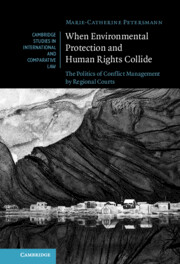‘We know that environmental pollution harms human lives, but can environmental protection also harm? Marie Petersmann incisively shows us that not all environmentalisms are alike, and that those privileged by international law and courts move between a narrow range, from conservative neo-Malthusianism to liberal sustainable development. These environmentalisms code perceptions of human-nature relationships, of how to know the world and be in it, and of evidence and expertise, that crowd out what Joan Martinez-Alier calls 'the environmentalism of the poor'. In analysis both powerful and poignant, Petersmann dissects the development of this mainstream of environmental protection, and who and what it excludes, and opens paths to new possibilities. A terrific and essential book.’
Surabhi Ranganathan - University of Cambridge
‘At a moment when environmental and human rights norms are becoming ever more intertwined, this book makes a timely and crucial scholarly and political intervention by investigating the points of dissonance, tensions and trade-offs between these regimes. Petersmann persuasively shows the limitations of this anthropocentric normative synthesis, and draws on a rich body of interdisciplinary feminist, decolonial and post-human scholarship to open possibilities for a different legal language and practice of care for more-than-human worlds. This book is compulsory reading for those wanting to re-imagine legal relations in the Anthropocene.’
Julia Dehm - La Trobe University
‘Laws that protect human rights and laws that protect the environment are growing ever closer. As we live through alarming ecological decline, theorists and practitioners are keen to point to normative convergence. Yet what is lost by this synergistic framing? Petersmann’s original and compelling legal analysis, which draws on the case law of regional human rights courts as well as anthropology, geography and political theory, demonstrates the high stakes of the inquiry, and impels new thinking about the relationship between human rights and environmental protection.’
Margaret Young - University of Melbourne
‘This scholarly, well-argued, and thought-provoking book rightly problematises uncritical assertions of ‘synergy’ between human rights and ‘the environment’ and exposes tacit imaginaries facilitating the on-going absorption of environmental concerns into human rights law. Petersmann draws timely and necessary attention to normative conflicts that are all too often over-looked. Theoretically astute and doctrinally informed, this book is simultaneously critical, affirmative and future-facing. It is a powerful contribution to the field.’
Anna Grear - Cardiff University
'Of major interest to all those working in human rights or environmental protection, this work argues its thesis clearly, regardless of whether or not the reader subscribes to her overall vision. Petersmann’s elegant style and insightful analysis make this a fine work, full of interesting and profound reflections on the evolution of environmental law as applied by regional human rights courts, the real-life relationship between these two issues, and, finally, a future perspective on the link between the protection of nature and human rights.'
Marta Torre-Schaub
Source: International & Comparative Law Quarterly
‘[Petersmann] conducts a stringent and meticulous analysis of the relevant case law of regional courts. At the same time, she raises fundamental questions about judicial reasoning in environmental cases and highlights the problematic role of expert knowledge and data in this context, providing a lucid account of the politics of ‘expertise’ in regional human rights courts. It is the combination of these different aspects that makes her analysis intriguing and fruitful for further research.’
Sigrid Boysen
Source: European Journal of International Law



